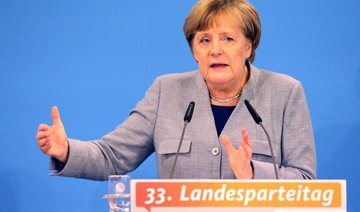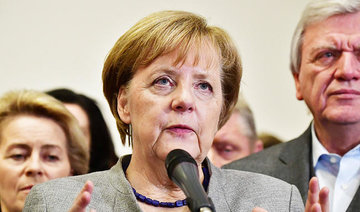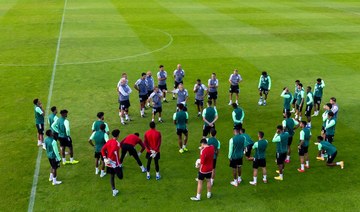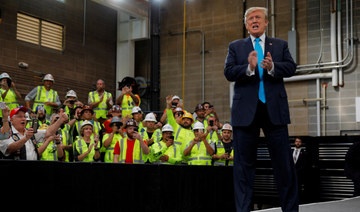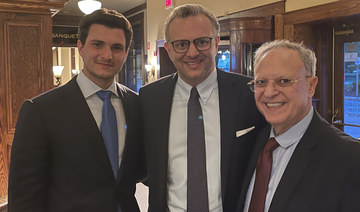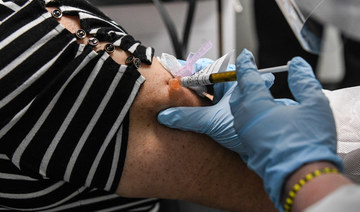BERLIN: German Chancellor Angela Merkel embarked Sunday on talks with the center-left Social Democrats on forming a new government, with leaders stressing the need for speed as they attempt to break an impasse more than three months after the country's election.
Leaders aim to decide by Friday whether there's enough common ground to move on to formal coalition negotiations. Whatever the result, it will be a while yet before a new administration is in place to end what is already post-World War II Germany's longest effort to put together a new government.
Why is there an impasse?
Germany's Sept. 24 election produced a parliamentary majority for only two plausible coalitions: the outgoing alliance of Merkel's conservative Christian Democratic Union and its Bavaria-only sister, the Christian Social Union, with the Social Democrats; or an untried combination of the conservatives, the pro-business Free Democrats and the left-leaning Greens. The Social Democrats vowed after slumping to their worst post-war election result to go into opposition, so Merkel opened talks on the alternative coalition — which collapsed in November. The Social Democrats then reluctantly reconsidered their refusal to mull extending the "grand coalition" of Germany's biggest parties. Shortly before Christmas, Germany beat its previous record of 86 days — set in 2013 — for the time from an election to the swearing-in of a new government.
How much longer?
If the parties decide this week that they are prepared to open formal coalition negotiations, that will require approval Jan. 21 by a congress of the Social Democrats. Party leader Martin Schulz, Merkel's defeated challenger in September, may face a tough job convincing members who so far are deeply skeptical of being junior partners in another "grand coalition." Those negotiations would take weeks. Further, Social Democrat leaders have promised to hold a ballot of the full party membership on any coalition deal — taking several more weeks.
What are the issues?
Possible stumbling blocks include migration: the conservatives want to maintain a block that bans migrants granted a status short of full asylum from bringing their closest relatives to Germany, while the Social Democrats want to end it. The two sides could also clash over the Social Democrats' call to reform the health insurance system and their differing ambitions for the European Union. Schulz recently advocated aiming for a federal "United States of Europe" by 2025, which goes too far for conservatives.
What if talks fail?
If the parties failed to form a coalition, the only remaining options would be for Merkel's conservatives to lead an unprecedented minority government, or a new election. Schulz has said some form of support for a minority government is an option for his party, but Merkel has made clear she wants a coalition. Polls so far suggest that a new election would produce a similar result to the last one.
And who would decide?
The road to either a minority government or a new election involves President Frank-Walter Steinmeier, who so far has opposed a new vote. The German Parliament cannot dissolve itself and Merkel cannot call a confidence vote as a caretaker chancellor. Steinmeier would first have to propose a chancellor to Parliament, who must win support from a majority of all lawmakers to be elected. If that fails, Parliament has 14 days to elect a candidate of its own choosing, again by an absolute majority. If that also fails, Steinmeier could choose to appoint a candidate who wins the most votes but falls short of a majority — or dissolve Parliament. An election would then have to be held within 60 days.
Germany's Merkel embarks on new talks to form government
Germany's Merkel embarks on new talks to form government
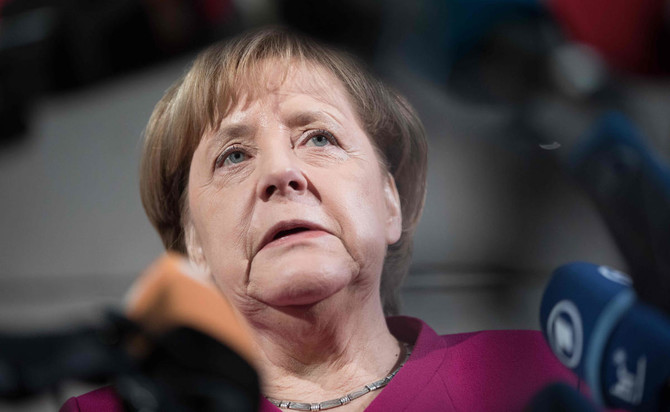
Russia says Daesh behind deadly Moscow concert hall attack
“In the course of the investigation... it has been established that the preparations, the financing, the attack, and the retreat of the terrorists were coordinated via the Internet by members of Khorasan Province (IS-K),” a branch of Daesh active in Afghanistan and Pakistan, Alexander Bortnikov, the head of FSB, was quoted as saying by the RIA Novosti news agency.
Putin has called the attack back in March as “a bloody, barbaric terrorist act” and said Russian authorities captured the four suspects as they were trying to escape to Ukraine through a “window” prepared for them on the Ukrainian side of the border. Russian media broadcast videos that apparently showed the detention and interrogation of the suspects, including one who told the cameras he was approached by an unidentified assistant to an Islamic preacher via a messaging app and paid to take part in the raid. Putin didn’t mention Daesh, known as Daesh in Arabic, in his speech to the nation, and Kyiv accused him and other Russian politicians of falsely linking Ukraine to the assault to stoke fervor for Russia’s fight in Ukraine, which recently entered its third year. US intelligence officials said they had confirmed the Daesh affiliate’s claim. “ISIS bears sole responsibility for this attack. There was no Ukrainian involvement whatsoever,” National Security Council spokeswoman Adrienne Watson said in a statement. The US shared information with Russia in early March about a planned terrorist attack in Moscow, and issued a public warning to Americans in Russia, Watson said. The raid was a major embarrassment for the Russian leader and happened just days after he cemented his grip on the country for another six years in a vote that followed the harshest crackdown on dissent since the Soviet times. Some commentators on Russian social media questioned how authorities, who have relentlessly suppressed any opposition activities and muzzled independent media, failed to prevent the attack despite the US warnings. Daesh, which fought against Russia during its intervention in the Syrian civil war, has long targeted Russia. In a statement posted by the group’s Aamaq news agency, the Daesh Afghanistan affiliate said that it had attacked a large gathering of “Christians” in Krasnogorsk. The group issued a new statement Saturday on Aamaq, saying the attack was carried out by four men who used automatic rifles, a pistol, knives and firebombs. It said the assailants fired at the crowd and used knives to kill some concertgoers, casting the raid as part of the Daesh group’s ongoing war with countries that it says are fighting against Islam. In October 2015, a bomb planted by IS downed a Russian passenger plane over Sinai, killing all 224 people on board, most of them Russian vacationers returning from Egypt. The group, which operates mainly in Syria and Iraq but also in Afghanistan and Africa, has claimed responsibility for several attacks in Russia’s volatile Caucasus and other regions in past years. It recruited fighters from Russia and other parts of the former Soviet Union.
England’s soccer fortunes add sporting drama to UK election
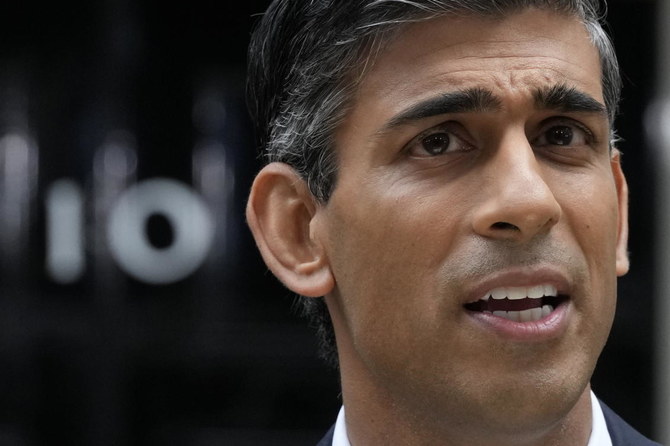
LONDON: Does British Prime Minister Rishi Sunak risk scoring an own goal by calling an election during the 2024 European Championship soccer tournament in July?
Sunak, himself a soccer fan, might be hoping for a boost to his struggling campaign if England do well, although whether there really is a link between sport and elections is disputed by experts.
Given the national team’s habit of morale-busting defeats in major tournaments, the chance of another hit to the English psyche appears just as likely a backdrop to the election.
On a positive note, however, England, runners-up three years ago, are among the favorites under manager Gareth Southgate with a team full of in-form attacking players including Harry Kane, Jude Bellingham, Phil Foden and Bukayo Saka.
Sunak unexpectedly called a national election for July 4 when the European Championship in Germany will be entering its most exciting phase.
Voters will head to the polls four or five days after England’s first knockout match, assuming the team avoid the embarrassment of elimination in the group stage.
There is also a chance England will have been pitted against their hosts and old rivals Germany in that last-16 game, a prospect that will fill many fans with dread.
Scotland are competing in the tournament too, potentially offering relief to the ruling Scottish National Party which, like Sunak’s Conservatives, is floundering in opinion polls.
Political pundits have offered non-sporting explanations for Sunak’s decision to call an early election, including a fall in Britain’s once double-digit inflation to close to 2 percent and signs that his flagship plan to send asylum-seekers to Rwanda might not get off the ground.
The timing has raised eyebrows, however, for the unusual overlap of an election campaign with the summer sporting calendar.
That has raised memories of one of the most painful of England’s defeats.
In June 1970, a 3-2 loss to West Germany in a World Cup quarter-final was followed four days later by a shock election defeat for incumbent Prime Minister Harold Wilson, triggering debate about the impact of the match.
Much has been written since about a possible link between sport and elections.
A 2010 paper by academics at Stanford and Loyola Marymount University in the United States said wins for local college American football teams earned political incumbents an extra 1.61 percentage points of support in subsequent Senate, gubernatorial and presidential elections.
Others have found no clear connection.
Stefan Mueller and Liam Kneafsey, at University College Dublin and Trinity College Dublin, mapped Irish election outcomes over decades with Gaelic football and hurling match results and found no correlation with support for incumbents or ruling party politicians.
Kneafsey said there were signs that some kind of influence on voters did occur.
“Whether they actually switch their votes, that’s probably a higher bar to clear and certainly the results there are inconclusive,” he said.
While that debate continues, it is clear that politics do weigh on the minds of soccer fans.
At a Euro 2016 match, three days after Britain’s shock Brexit referendum decision, many England fans joined in a crude chant directed at the European Union which ended with the words: “We all voted out.” England were beaten 2-1 by underdogs Iceland and were knocked out of the competition.
Another risk for Sunak is that sports fans resent his scheduling of the election at a time when not only Euro 2024 is taking place — from June 14-July 14 — but also the Wimbledon tennis championships which run from July 1-14.
Campaigning will also overlap with cricket’s T20 World Cup involving England and Scotland from June 2-29.
Some academics will be happy, however, as they will be able to do more research into the links between sport and voting patterns.
“We could actually do with politicians having more elections during this time to definitively test this,” Kneafsey said.
Trump, without evidence, claims migrants in US illegally ‘building army’ to attack Americans
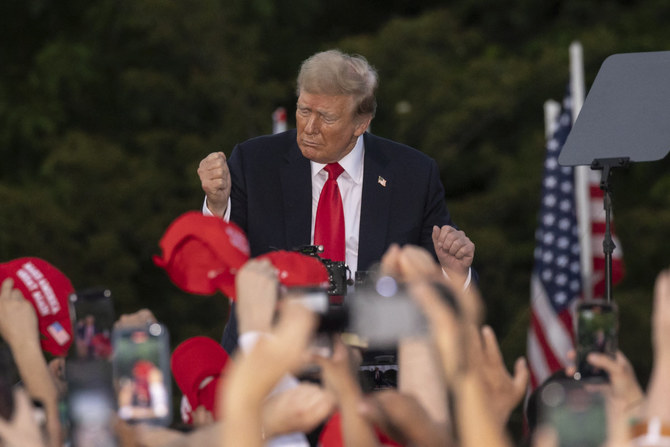
- He sought to portray migrants from China, the DR Congo and other countries as a violent threat, even as studies show immigrants are not more likely to engage in criminality
- Trump also sought to link the illegal entry of migrants from the Mexico border to the economic plight of Black and Hispanic voters, claiming that migrants were taking their jobs
NEW YORK: Republican presidential candidate Donald Trump claimed without evidence on Thursday that immigrants from Africa, the Middle East and elsewhere were “building an army” to attack Americans “from within,” once again using inflammatory rhetoric about migrants in the US illegally.
During a rally in the mainly Hispanic and Black neighborhood of New York City’s South Bronx, Trump sought to portray migrants from China, the Democratic Republic of the Congo and other countries as a violent threat, even as studies show immigrants are not more likely to engage in criminality.
“Almost everyone is a male and they look like fighting age. I think they’re building an army,” Trump said to a few thousand supporters who gathered to hear him in the South Bronx’s Crotona Park. “They want to get us from within.”
Throughout his campaign, Trump has repeatedly used incendiary language to accuse immigrants in the US illegally of fueling violent crime, calling them “animals” responsible for “poisoning the blood” of the country. As evidence, he points to individual instances of crimes, rather than aggregate data.
“We are not going to let these people come in and take our city away from us and take our country away,” Trump said, vowing to carry out “the largest criminal deportation operation in our country’s history” if re-elected to the White House.

Trump also sought to tie record levels of migrants caught crossing the US-Mexico border illegally with the economic plight of Black and Hispanic voters, arguing, without evidence, that migrants were taking their jobs.
Trump’s decision to speak in the Bronx was in part a matter of convenience. His campaign schedule has been crimped by his trial in New York on charges he falsified business records to hide a hush money payment to a porn star. In April, he made a campaign appearance at a convenience store in Harlem, New York.
Trump is locked in a tight race with Democratic President Joe Biden ahead of the Nov. 5 election. The Bronx rally was part of his effort to exploit Biden’s weakening support among Hispanic and Black voters.
Roughly 55 percent of Bronx County residents are Hispanic and about one-third are Black, and the crowd on Thursday was more racially mixed than his usual rallies, which are predominantly white.
Trump’s campaign had a permit for up to 3,500 people to attend the rally, the New York City Parks Department said.
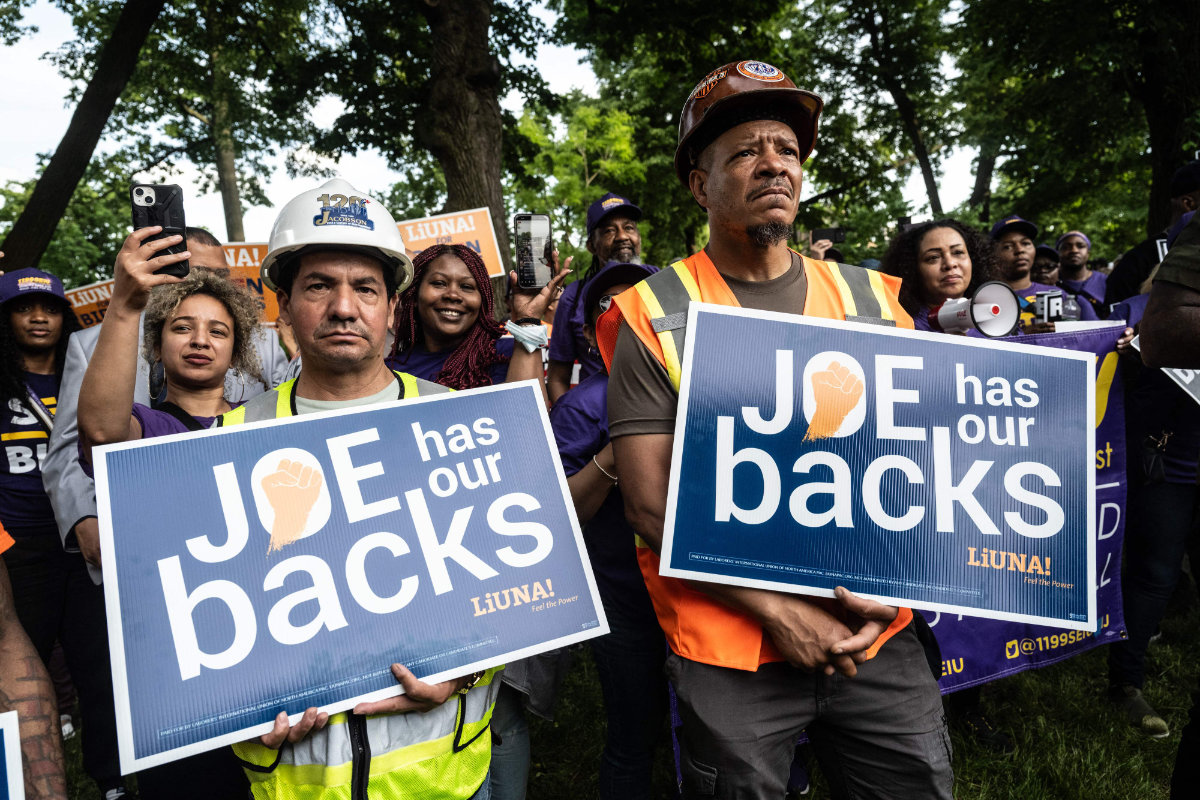
‘Historic’ rally in the Bronx
Recent polls suggest the Trump is gaining ground with Blacks and Hispanics, who were critical to Biden’s win in 2020. Trump strategists see a chance to grab enough of their votes to make the difference in swing states in November.
Biden has had a flurry of actions and events focused on bolstering support among African American voters. He has singled out Trump and other Republicans for attacking programs aimed at improving diversity, equity and inclusion, and on Thursday the president’s campaign released a pair of TV and radio ads criticizing Trump’s treatment of Black people.
Reuters interviewed nine Hispanic and Black rally attendees who said they will vote for Trump in 2024. Of the seven who were voting age in 2020, six voted for Trump. They cited the economy and immigration as their main reasons for supporting him.
“It’s historic that he’s here,” said Steven Suarez, 46, who is Puerto Rican, a reference to Trump being the first Republican presidential candidate to make a stop in the Bronx since Ronald Reagan in the 1980s. “He could have gone anywhere in New York City. He could have gone to Manhattan. He chose to come here.”
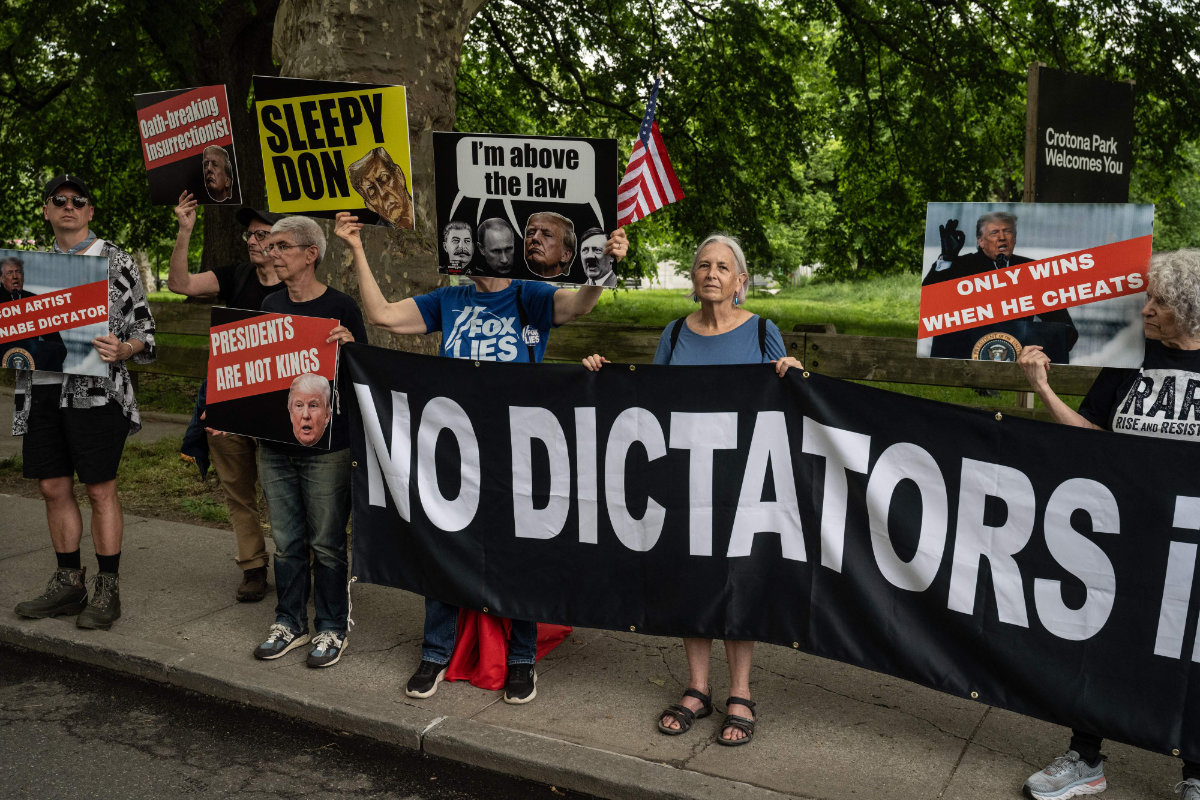
In a New York Times/Siena College poll in March, Trump was selected by 23 percent of Black and 46 percent of Hispanic respondents in a one-on-one matchup with Biden. That is far higher than the 12 percent of Black and 32 percent of Hispanic voters Trump won in 2020, according to Edison Research exit polls.
Political analysts have attributed weakening support for Biden among voters of color in part to the outsized impact of inflation on people living paycheck to paycheck.
Attending his first Trump rally on Thursday, Ed Rosa, 60, said he was a longtime Democratic voter but felt his vote for Biden in 2020 was a mistake. He said the Democratic Party had “become too socialist” and was not handling the economy or the southern border well.
Netanyahu will soon address joint session of US Congress, House Speaker Johnson says
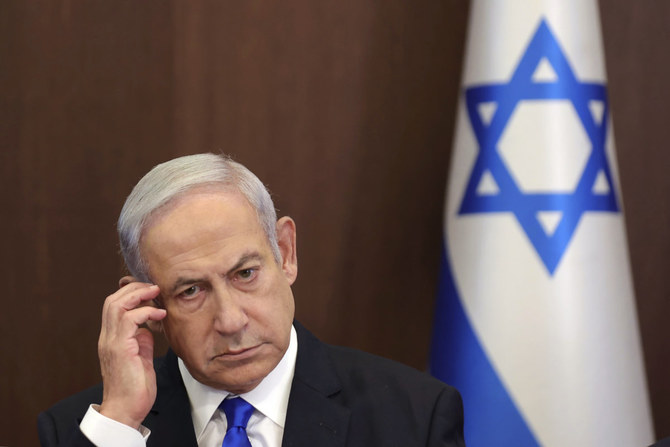
- Johnson made the announcement in a keynote speech at the Israeli embassy’s annual Independence Day reception
- The diplomatic gathering came amid strains between Biden and Netanyahu over a US push for Israel to do more to protect Palestinian civilians in the war against Hamas militants in Gaza
WASHINGTON: Republican US House Speaker Mike Johnson said on Thursday Israeli Prime Minister Benjamin Netanyahu would soon address a joint meeting of Congress amid heightened tensions with President Joe Biden over the Israeli leader’s handling of the war in Gaza.
Delivering a keynote speech at the Israeli embassy’s annual Independence Day reception, Johnson, the top congressional Republican and a critic of the Democratic president’s Israel policy, said it would be “a strong show of support for the Israeli government in their time of greatest need.”
Such a speech is sure to further anger some progressive Democrats critical of Israel’s military campaign in Gaza and Biden’s support for it. Netanyahu has closely aligned himself with Republicans.
The diplomatic gathering in Washington comes amid strains between Biden and Netanyahu over a US push for Israel to do more to protect Palestinian civilians in the war against Hamas militants in Gaza.
The embassy gave equal billing to Democratic US Representative Pete Aguilar, who shared the high-profile platform with Johnson at a more subdued event under the shadow of the Gaza war. “As Americans, we reaffirm our commitment to Israel’s sovereignty,” he said.
Speaking first, Johnson said to applause: “Tonight I’m happy to announce ... we will soon be hosting Prime Minister Netanyahu at the Capitol for a joint session of Congress.”
Successive US administration have usually sent a high-level official to the Independence Day receptions, reflecting Israel’s status as Washington’s top Middle East ally.
Vice President Kamala Harris, who in recent months has called the situation in Gaza a “humanitarian catastrophe” and has urged a ceasefire, delivered last year’s keynote, mostly extolling US backing for Israel.
An Israeli official said this year the embassy wanted to honor lawmakers in a bipartisan way with speaking roles in appreciation for congressional approval of billions of dollars in new US military aid to Israel.
The reception took place on the same night as a White House state dinner for Kenyan President William Ruto, which the Israeli official said created a scheduling conflict for administration cabinet members.
Several less senior Biden aides were in attendance, including Derek Chollet, Secretary of State Antony Blinken’s counselor.
Johnson's veiled swipe at Biden
Johnson and Aguilar both condemned the International Criminal Court prosecutor’s decision this week to seek arrest warrants for Netanyahu and his defense chief, Yoav Gallant. The prosecutor also asked for warrants to capture Hamas leaders responsible for the deadly Oct. 7 cross-border attack on Israel, which triggered the Gaza war.
Johnson took a veiled swipe at Biden, saying “some leaders” have sought to withhold “vital weapons” from Israel. Biden has paused one shipment of bombs and warned he could delay others if Netanyahu carries out an all-out ground offensive in the refugee-packed city of Rafah in southern Gaza. But the flow of weapons has mostly continued.
Security was tight around the National Building Museum in downtown Washington. One small group of pro-Palestinian protesters could be heard playing a loud recording accusing Israel of killing innocent civilians.
On Tuesday, Johnson said he was close to inviting Netanyahu, a right-wing leader who had warm relations with former President Donald Trump.
Johnson, a Trump ally, had issued Senate Majority Leader Chuck Schumer an ultimatum to sign a letter inviting Netanyahu to address a joint meeting or else he would have him only speak to the House of Representatives.
Schumer had signaled he was open to Congress hosting Netanyahu, despite declaring in March that the Israeli leader had “lost his way” and calling for new elections in Israel.
Johnson did not offer a date for Netanyahu’s speech. Addresses to Congress are a rare honor generally reserved for the closest US allies.
Netanyahu has already given such speeches three times, most recently in 2015. That year, Republican leaders invited him without consulting Democratic then-President Barack Obama, as Netanyahu joined them in an unsuccessful bid to derail Obama’s international nuclear deal with Iran.
Johnson, struggling to keep his fractious Republican House majority intact, has been a prominent voice in the US political divide over Israeli policy. Politicization of the issue has intensified ahead of the November election in which Biden is running against Trump.
In contrast to past years’ gala celebrations, this year’s reception, marking the 76th anniversary of Israel’s founding, was billed as a “solidarity event.”
Israel is fighting to wipe out Hamas militants who attacked Israel on Oct. 7, killing around 1,200 people and seizing 253 hostages, according to Israeli tallies.
Palestinian authorities say more than 35,000 people have been killed during Israel’s campaign in Gaza, many of them women and children.
HPV vaccines prevent cancer in men as well as women, new research suggests
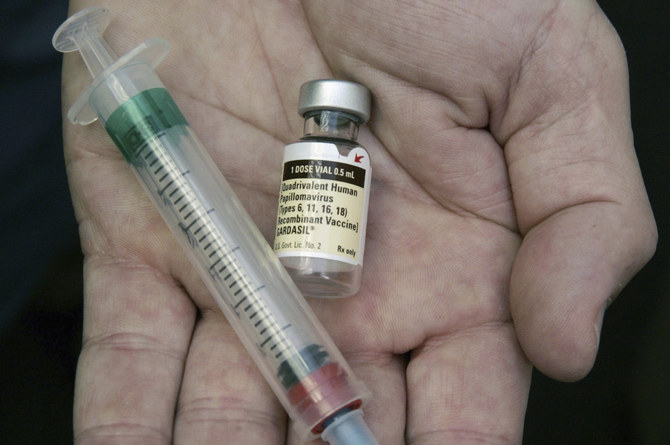
- For the study, researchers compared 3.4 million people of similar ages — half vaccinated versus half unvaccinated — in a large health care dataset
- Research suggests vaccinated men have fewer cancers of the mouth and throat — twice as common in men than in women — compared to those who didn’t get the shots
New research suggests the HPV vaccine is preventing cancer in men, as well as in women, but fewer boys than girls are getting the shots in the United States.
The HPV vaccine was developed to prevent cervical cancer in women and experts give it credit, along with screening, for lowering cervical cancer rates. Evidence that the shots are preventing HPV-related cancers in men has been slower to emerge, but the new research suggests vaccinated men have fewer cancers of the mouth and throat compared to those who didn’t get the shots. These cancers are more than twice as common in men than in women.
For the study, researchers compared 3.4 million people of similar ages — half vaccinated versus half unvaccinated — in a large health care dataset.As expected, vaccinated women had a lower risk of developing cervical cancer within at least five years of getting the shots. For men, there were benefits too. Vaccinated men had a lower risk of developing any HPV-related cancer, such as cancers of the anus, penis and mouth and throat.
These cancers take years to develop so the numbers were low: There were 57 HPV-related cancers among the unvaccinated men — mostly head and neck cancers — compared to 26 among the men who had the HPV vaccine.
“We think the maximum benefit from the vaccine will actually happen in the next two or three decades,” said study co-author Dr. Joseph Curry, a head and neck surgeon at the Sidney Kimmel Cancer Center in Philadelphia. “What we’re showing here is an early wave of effect.”
Results of the study and a second were released Thursday by the American Society of Clinical Oncology and will be discussed next month at its annual meeting in Chicago. The second study shows vaccination rates rising but males lag behind females in getting the HPV shots.
HPV, or human papillomavirus, is very common and is spread through sex. Most HPV infections cause no symptoms and clear up without treatment. Others develop into cancer, about 37,000 cases a year, according to the Centers for Disease Control and Prevention.
In the US, the HPV vaccine has been recommended since 2006 for girls at age 11 or 12, and since 2011 for boys the same age. Catch-up shots are recommended for anyone through age 26 who hasn’t been vaccinated.
In the second study, researchers looked at self- and parent-reported HPV vaccination rates in preteens and young adults in a large government survey. From 2011 to 2020, vaccination rates rose from 38 percent to 49 percent among females, and among males from 8 percent to 36 percent.
“HPV vaccine uptake among young males increased by more than fourfold over the last decade, though vaccination rates among young males still fall behind females,” said study co-author Dr. Danh Nguyen at the University of Texas Southwestern Medical Center in Dallas.
Parents of boys, as well as girls, should know that HPV vaccines lower cancer risk, said Jasmin Tiro of the University of Chicago Medicine Comprehensive Cancer Center who was not involved in the research. And young men who haven’t been vaccinated can still get the shots.
“It’s really important that teenagers get exposed to the vaccine before they’re exposed to the virus,” she said.


